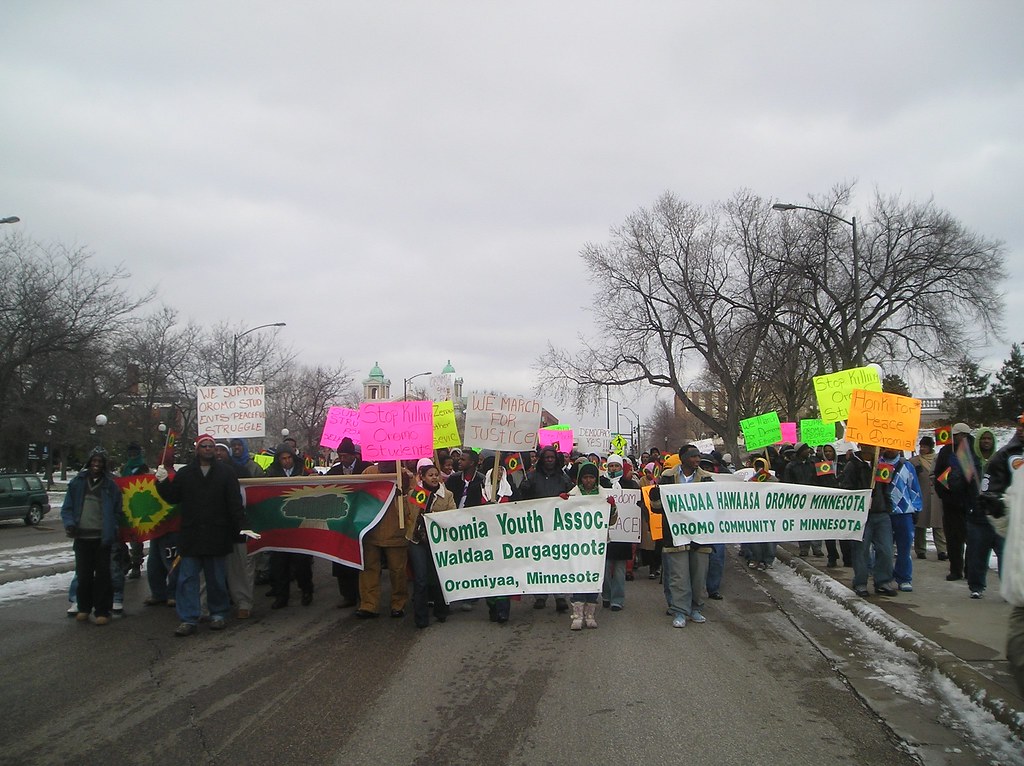
The New Environmentalists: How to Make the Green Movement Less White
By Van Jones, ColorLines
Posted on August 7, 2007, Printed on August 8, 2007
http://www.alternet.org/story/58613/
In response to mounting ecological crises, the United States is going through its most important economic transformation since the New Deal. Unfortunately, the vital process of change along more eco-friendly lines is moving ahead with practically zero participation from people of color.
Hundreds of mayors and several governors are bucking the Bush administration and committing themselves to the carbon-cutting principles of the Kyoto treaty on climate change. The U.S. Congress is debating an energy bill this year that could be a watershed for alternative energy sources.
What's more, regular people are way ahead of these leaders. U.S polls show super-majorities want strong action on the climate crisis and other environmental perils. And consumers are reshaping markets by demanding hybrid cars, bio-fuels, solar panels, organic food and more. As a result, the "lifestyles of health and sustainability" sector of the U.S. economy has ballooned into a $240 billion gold mine. And total sales are growing on a near-vertical axis.
The Economist magazine calls it "The Greening of America." Indeed, we are witnessing the slow death of the Earth-devouring, suicidal version of capitalism. We're even seeing the birth of some form of "eco-capitalism." To be sure, a more "ecologically sound" market system will not be a utopia. But at least it will buy our species a few extra decades or centuries on this planet.
That's the good news. Here is the bad news.
The celebrated "lifestyles" sector is probably the most racially segregated part of the U.S. economy; at present, it is almost exclusively the province of affluent white people. Few entrepreneurs of color are positioned to reap the benefits of the government's push to green the economy.
We are seeing a major debate about the direction of the U.S. economy -- in which communities of color apparently have nothing to say. Our near-silence on such key issues has no precedent, at least not since before the Civil War.
How can this be? Black, Latino, Asian and Native American communities suffer the most from the environmental ills of our industrial society. Our folks desperately need the new economic activity, investments and opportunities that this major transition is beginning to generate.
To put it bluntly, people of color have much more directly at stake in the greening of America than white college students do. Why are they marching for carbon caps, while most of us just yawn and change the channel?
When these new formations and networks emerge, all racial justice activists will become, in some sense, environmental justice activists.
More people of color have not yet grabbed the microphone for three reasons: our long-standing pattern of viewing environmental issues as luxury concerns; the mainstream media's "whites only" coverage of the green phenomenon; and serious structural impediments to action within the racial justice movement itself.
First of all, too often we have said: "We are overwhelmed with violence, bad housing, failing schools, excessive incarceration, poor healthcare and joblessness. We can't afford to worry about spotted owls, redwood trees and polar bears."
But Hurricane Katrina and its aftermath taught us that the coming ecological disasters will hit the poor first and worst. More of us are beginning to see that there can be no separation between our concern for vulnerable people and our concern for a vulnerable planet.
Secondly, any U.S. magazine's "Special Green Issue" typically will not show many people of color, despite the incredible achievements of numerous environmentalists of color across the country. Many racial justice activists see this kind of coverage, shrug our shoulders and understandably assume that green equals white.
But this is a mistake. When did we start trusting the corporate media to fairly calculate our interests in any major topic or development in U.S. society? When have our activists and advocates ever accepted their frame and parameters in determining what is important or what we should do? It should not surprise anyone that the mainstream media does not reflect our deep and profound interests in the greening of the economy. And it is high time for us to make our own assessment and create our own strategy for shaping the process in accordance with our interests.
Finally, at least among committed activists, there is a deeper reason that we have not mobilized at the appropriate scale. And that reason can be found within the structure of our racial justice movement itself. Our present deployment of resources simply does not let us meet the challenges and opportunities that the green revolution is generating, simply because it is nobody's job to take them on.
Because no racial justice organization can tackle every issue and champion every cause, our groups have evolved a fairly strict division of labor. A single organization will ordinarily focus on just one issue -- criminal justice, immigrant rights, economic justice, violence prevention, educational equity, school reform, reproductive justice, what have you. Out of deference to each other (and to stay within funders' guidelines), our organizations bend over backwards to keep within their chosen issue areas and to stay off each other's "turfs."
One important issue area is called "environmental justice." The environmental justice movement emerged in the 1980s to challenge toxic pollution in the neighborhoods of low-income people and people of color. Made up of hundreds of mostly small, tough and scrappy organizations, this movement has won many local and national victories over the past two decades. The "EJ" movement's (often pint-sized) dynamos have shut down scofflaw polluters, power plants and incinerators. They have cut toxic emissions and improved public health in innumerable communities. And their leaders have elevated the concept of "environmental racism" to mainstream prominence.
Because of this movement's success and visibility, most racial justice activists today presume that anything related to the environment falls under the purview of our existing environmental justice organizations. Therefore when we hear all this "green talk," we tend to either assume it doesn't have anything to do with our communities or that someone else already has the mandate and the capacity to deal with it. This assumption is another reason that other racial justice leaders tend to ignore "all of this green stuff."
Well, such an approach might have served us in years past, but not today.
Today's environmental justice movement was designed to protect our interests in a toxic, pollution-based economy. It was not designed to promote our interests in a mushrooming, $250 billion green economy. Nor was any other racial justice movement or network. It is wildly unrealistic to assume that the already over-stretched and under-funded EJ groups can somehow meet this colossal, historic challenge on their own. It is unfair to expect them to do so.
So we stand now at the dawn of a new economy. But no part of the racial justice movement is charged with the task of ensuring that the new laws and new industries do right by low-income people and people of color.
We must change this. If we do not get involved, we will end up with eco-apartheid -- a society with ecological haves and have-nots. Imagine a world in which wealthy people have clean air, fresh water, healthy food and no-cost energy, thanks to solar panels, organic agriculture and green technology. Meanwhile, poor neighborhoods continue to choke in the fumes of the last century's pollution-based industries.
To put it bluntly, people of color have much more directly at stake in the greening of America than white college students do.
We must say no to a future in which our peoples get hit "first and worst" by the coming ecological catastrophes and benefit "last and least" from the emerging ecological advances.
This next environmental revolution -- call it the "Green for All" revolution -- will require especially sophisticated and skilled leadership.
We will have to continue to fight corporate polluters. And we would also be wise to consider and explore partnerships with eco-capitalists, who are willing to grow their businesses in a cleaner and greener way. We will continue saying no to the economic oppression of the dying economy. But we must also learn how to say "yes" to economic opportunity of the emerging economy. As a part of a new economic strategy, we should help interested communities and workers to create their own green collectives and co-ops (as did the Green Workers' Cooperative in the South Bronx).
We will continue fighting for equal protection from the worst of the pollution-based economy. And we will also add demands for equal access and equal opportunity in the clean and green economy.
We will also need tighter formations -- united fronts that can work explicitly for racial justice and inclusion. These networks and coalitions will advance independent slogans, such as Majora Carter's demand to "green the ghetto" or the Ella Baker Center's call for "green-collar jobs, not jails" for urban youth. And they will be more comfortable for many people of color than many of the present "green wave" spaces.
When these new formations and networks emerge, all racial justice activists will become, in some sense, environmental justice activists. But by that point, the environmental justice movement itself will be transformed into a massive movement, focused on a new paradigm of economic development, fighting to birth a green economy that is strong enough to lift people out of poverty.
Van Jones is executive director of the Ella Baker Center for Human Rights in Oakland, California.
© 2007 Independent Media Institute. All rights reserved.
View this story online at: http://www.alternet.org/story/58613/
 here's no real beginning or end to my story of Africa. The memories of my two months there have bled into every part of my existence and are completely inescapable.
here's no real beginning or end to my story of Africa. The memories of my two months there have bled into every part of my existence and are completely inescapable. 


 inneapolis might be getting greener in 2008 without planting a single tree.
inneapolis might be getting greener in 2008 without planting a single tree. 